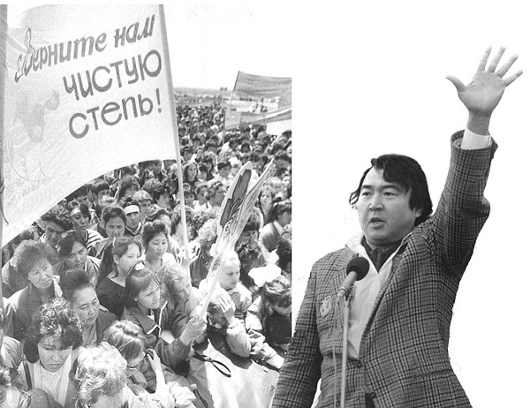Olzhas Suleimenov at the celebration of his 85th birthday in Al-Farabi Kazakh National University
“To study the history and linguistics with the sole intention of defining your own place among the people and the place of my people in humanity”.
May 18 is the birthday of an outstanding poet, People’s writer of Kazakhstan – Olzhas Suleimenov. He is widely known as the linguist, researcher, turcologist, popular politician, prominent statesman and public figure.
Olzhas Suleimenov was born on May 18, 1936 in Almaty city. His father was an officer of the First Kazakh cavalry regiment. Stalin’s repressions had not bypassed the Suleimenov’s family. When Olzhas turned one year old, his father was shot, like many of the best representatives of the Red Army command staff. Olzhas Suleimenov’s ancestors were the poets, musicians and warriors from his father’s side, and the adobe builders with his mother’s side. Besides that, Olzhas received his name from an ancestor in the seventh generation of Olzhabai batyr, who commanded the right wing of Abylai khan’s cavalry.
In 1954, after graduating from the secondary school №28 named after Manshuk Mametova, Olzhas Suleimenov entered the geological survey faculty of the Kirov Kazakh State University. However, his poetic gift forced him to review his path of life and defer his diploma in geological engineering.
In 1958, he enrolled in the Higher Literary Courses at the Maxim Gorky Literature Institute in Moscow.
After graduating from the courses, he worked as the head of the poetry department of the “Prostor” (scope) magazine, chief editor of the script and editorial board of the “Kazakhfilm” studio, First Secretary of the Writers’ Union of Kazakhstan, First Secretary of the Board of Kazakhstan’s Union of Cinematographers and Secretary of the Union of Soviet Writers.
From 1991 to 1994, Olzhas Suleimenov was on the sabbatical term. Olzhas Suleimenov’s authority as a politician is enormous. His background materials and profile show: he is a member of the Committee of the Supreme Council of the Republic of Kazakhstan on Ecology and Environmental Management, from 1995 to 2001, he was at the diplomatic work as Extraordinary and Plenipotentiary Ambassador of Kazakhstan to Italy, then, to Greece and Malta. Since 2001, he has served as the Permanent Representative of Kazakhstan to UNESCO. He was a Deputy of the Supreme Council of Kazakhstan of the 10th and 13th convocations, Deputy of the Supreme Council of the USSR of the 11th convocation and People’s Deputy of the USSR (1989-1991).
Most of all, Olzhas Suleimenov’s creative path is connected with two major unions of Kazakhstan – the Union of Writers and the Union of Cinematographers. Particularly, Olzhas Suleimenov became one of the initiators and organizers of the 5th conference of writers from Asia and Africa in Almaty. Under him, the domestic cinema gained an international fame. “Kazakhfilm” studio released such films as the “Kyz-Zhibek”, “Anxious morning”, “Shot at the Karash Pass”, “Gray fierce”.
As a public figure and politician, a special merit of Olzhas Suleimenov is the creation of the “Nevada – Semei” movement, which achieved the establishment of the moratorium on the explosions at the Semipalatinsk Nuclear Test Site in a short time. On August 28, 1991, Former President of Kazakhstan, Nursultan Nazarbayev signed a decree on the closure of the landfill.

Olzhas Suleimenov and the “Nevada – Semei” movement
Being involved in the extensive state and public activities, Olzhas Suleimenov has never forgotten that first of all, he was a poet and writer. Olzhas Suleimenov’s poetry teaches the reader the truth and understanding of a historical formation of the people. Olzhas Suleimenov’s poems are distinguished by depth of thought and greatness. They have the vivid expression, visible imagery, subtle humour, sharp satire, unexpected twists and many other facets. The poetic works were highly appreciated by readers and critics. Such masters of the word as M. O. Auezov, K. Simonov, R. Gamzatov, G. Musrepov, Ch. Aitmatov, E. Miezelaitis and others wrote about the author’s creative work.
The first book of the poetries and poems “Argamak” was published in 1961. In the same year, his poem “Land, bow to a man” was published, which became one of the best works of the Soviet poetry and brought the author a wide popularity. A poem reflected the poet’s reflections upon the fate of a man, on his thoughts.
In 1962, the poetry collection “Sunny Nights” was published, followed by “Paris Night” “Good Sunrise Time”, “Year of the Monkey”, “Selected Lyrics”, “Clay Book”, “Repeating at Noon”, “Everyday Morning”, “Round Star”, “Fire Transformation”, “Defining the Shore”, “Az and I”, “Language of the Letter”.
The “Clay Book” is one of the most important works of Olzhas Suleimenov. This is an ancient love story that makes a person the highest among all things. It is built on the deep historical associations, it has an eastern spiritual and philosophical tradition. The books “Az and I”, “Language of the Letter” and articles, dedicated to the interaction of Turkic, Slavic and other cultures, sparked unabated discussions and contributed to the formation of new approaches to the history of Turkic cultures.
Olzhas Suleimenov’s literary talent was widely revealed in film drama. He wrote the scripts, based on which the feature films “Land of the Fathers”, “Blue Route”, “Winter is not the field season”, “Accept Adam”, “The Last Transition”and a number of documentary films were created as well.
It is worth noting that Olzhas Suleimenov was awarded the “Barys” Order of the 1st degree. He is a laureate of the State Prize of the Kazakh SSR and the Lenin Komsomol Prize of Kazakhstan, and the laureate of the “Tarlan” Prize, etc.
The creative and vibrant life of Olzhas Suleimenov was fully described in his personal archive, which in 1996 was entered the state storage in the Central State Archive of the Republic of Kazakhstan as a form of gift.




